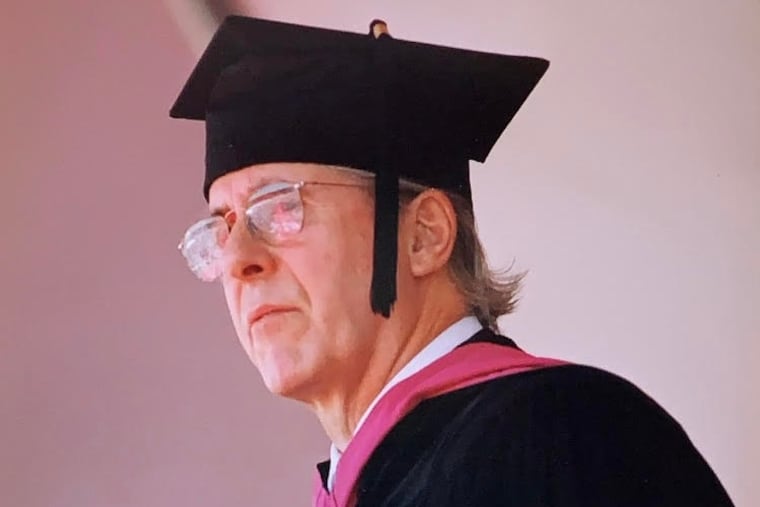John C. Keene, emeritus professor of city and regional planning, legal expert, and international lecturer, dies at 90
In a 1998 commencement address, he told Penn graduates to take "responsibility for protecting the global ecosystem, for controlling environmental pollution, and for reducing social injustice."

John C. Keene, 90, of Haverford, an award-winning professor emeritus and former chairman of the department of city and regional planning at the University of Pennsylvania, legal consultant to governments and others on environmental and farmland protection, international lecturer, mentor, author, and veteran, died Friday, March 4, of prostate cancer at his home.
Professor Keene was tireless in his 55 years of service at Penn. A lawyer and expert on laws regarding urban planning, growth management, and environmental policy, he was the school’s department chairman of city and regional planning from 1988 to 1992 and served two terms as chair of the department’s graduate group and its doctoral program.
He was also, among other roles, chair of the faculty senate, university ombudsman, and coordinator of an advanced master’s degree program in environmental management that partners Penn with Mines Paris Tech in France and Tsinghua University in China.
Described as “an academic thoroughbred” and “a broad thinker” by colleagues, Professor Keene taught an array of classes and lectured about the legal aspects of planning and planning theory, and he wrote a chapter for a 2001 trade publication that illustrated the significance of that work.
“Human society has embarked on a course that will bring us into collision with the capacity of our natural systems to sustain us,” he wrote in Managing Change: Sustainable Approaches to the Conservation of the Built Environment. “Those involved in historic preservation and cultural conservation can work to ameliorate some of the contributing causes to the unsustainability of metropolitan areas across the world.”
A colleague at Penn’s Weitzman School of Design wrote in an online tribute: “He practically invented the earliest thinking on growth management, farmland protection, and transfer of development rights.”
Professor Keene spoke French and Spanish, and lectured in more than 50 countries. He wrote, cowrote, and edited dozens of reports, articles, analyses, and scholarly books, including Saving American Farmland: What Works in 1997 and The Law of Agricultural Land Preservation in the United States in 2018.
He was a member of several preservation committees and received a 1999 University Research Foundation award to study planning in three regions of northern Spain.
He won the 2004 Christian R. and Mary F. Lindback Foundation Award for Distinguished Teaching at Penn and the 2005 G. Holmes Perkins Award for Distinguished Teaching from the school of design.
“He was a lifelong learner,” said his daughter Lisa.
Professor Keene was born Aug. 17, 1931, in Wynnewood. He graduated from Episcopal Academy in 1949 and earned a bachelor’s degree at Yale University in 1953, a law degree from Harvard Law School in 1959, and a master’s degree in city planning from Penn in 1966.
He served in the Navy from 1953 to 1956 as a combat information officer on the USS Strickland. He married Emma Thune in the 1950s, and they had daughters Lisa, Suzy, and Katy and sons John and Peter.
After a divorce, Professor Keene married Ana Maria Delgado in 1973, and her children — daughter Carmen and sons Carlos, Rene, Mario, Raul, and Silvio — blended nearly seamlessly with his children. “He had a way to make it easy to come together,” said his wife. “He was a patient, thoughtful, dear man who was dedicated to his family.”
He partnered with fellow planner Bob Coughlin in 1976 to form Coughlin, Keene & Associates, and they consulted with townships, counties, and others for two decades on planning issues.
Professor Keene liked opera and sang in high school with the glee club and a barbershop quartet and in college with Yale’s freshman chorus. He was interested in genealogy, wrote a 500-page memoir, and photographed as many family gatherings as possible.
A former student said in a tribute: “I only hope that I can inspire others half as much as he inspired me.”
His wife said: “We were yin and yang.”
In addition to his wife and combined children, Professor Keene is survived by 24 combined grandchildren, and two great-grandchildren. His former wife and a sister died earlier.
Services are to be at 3 p.m. Saturday, April 30, at St. Christopher’s Church, 226 Righters Mill Rd., Gladwyne, Pa. 19035.
Donations in his name may be made to Penn’s Urban Studies Program and City and Regional Endowed Fellowship Fund, University of Pennsylvania, Office of the Treasurer, P.O. Box 71332, Philadelphia, Pa. 19176.